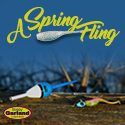I already mentioned, more than once, that I've seen it happen multiple times to public lakes in southern middle Tennessee, which is not "up north." Furthermore, I traveled to the panhandle of Florida just a month ago to fish for hand-painted bluegill on the Dead Lakes. In two days of hard fishing, I caught seven; and no one else was catching any. If I've ever fished a body of water that had been overfished, it was that one.
Here's an article from a month ago in the Florida Sportsman in which the author quotes a Florida fly-fishing guide as saying that the fishing for big bluegill is not what it once was in Florida:
Bluegill Fishing on the Fly - Florida Sportsman
Here's a recent article about Lake Okeechobee rebounding, in which a state biologist is talking about how well the bluegill and redear are doing - then she cites as example the fact that the bluegill are averaging seven to eight inches and some of the redear are even nine. This from a lake that twenty years ago, according to one guide's website, was producing stringers of two-pound bluegill.
Anglers, biologists agree
For a biologist to be excited about a nine-inch redear or an eight-inch bluegill on Okeechobee, tells you how far that fishery has fallen just in the recent past. It's the seventh-largest freshwater lake in the U.S.; if it can happen to that lake, it can happen to any lake. And, as I already mentioned in a previous post, multiple large lakes in southern California that as recently as two years ago were some of the best public waters in the world for trophy bluegill, are being fished out as we speak. But by all means, keep yanking out all of the big ones you catch. Don't think about other anglers - they don't matter. There aren't many top-notch public bluegill fisheries left in this country, so since you obviously live near one, make sure it goes the same route the others have.


 Likes:
Likes:  Thanks:
Thanks:  HaHa:
HaHa: 


 ........99999...........
........99999...........
















